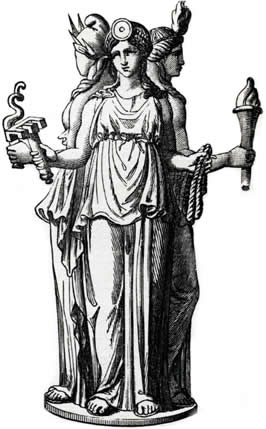THE HORNED GOD
The Horned God has been explored within several psychological theories, and has become a recurrent theme in fantasy literature.The term Horned God itself predates Wicca, and is an early 20th century syncretic term for a horned or antlered anthropomorphic god with pseudohistorical origins who, according to Margaret Murray's 1921 The Witch-Cult in Western Europe, was the deity worshipped by a pan-European witchcraft-based cult, and was demonized into the form of the Devil by the Mediaeval Church. The Horned God is one of the two primary deities found in some neopagan religions. He is often given various names and epithets, and represents the male part of the religion's duotheistic theological system, the other part being the female Triple Goddess. In common Wiccan belief, he is associated with nature, wilderness, sexuality, hunting and the life cycle. Whilst depictions of the deity vary, he is always shown with either horns or antlers upon his head, often depicted as being theriocephalic, in this way emphasizing "the union of the divine and the animal", the latter of which includes humanity.
THE TRIPLE GODDESS
The "Holy Trinity" of Wicca represents the Triple Goddess. The Triple Goddess has been adopted by many neopagans (notably Wiccans) as one of their primary deities . The term triple goddess is infrequently used outside of Neopaganism to instead refer to historical goddess triads and single goddesses of three forms or aspects. In common Neopagan usage the three female figures are frequently described as the Maiden, the Mother, and the Crone, each of which symbolises both a separate stage in the female life cycle and a phase of the moon, and often rules one of the realms of earth, underworld, and the heavens. These may or may not be perceived as aspects of a greater single divinity. The feminine part of Wicca's duotheistic theological system is sometimes portrayed as a Triple Goddess, her masculine counterpart being the Horned God.


No comments:
Post a Comment